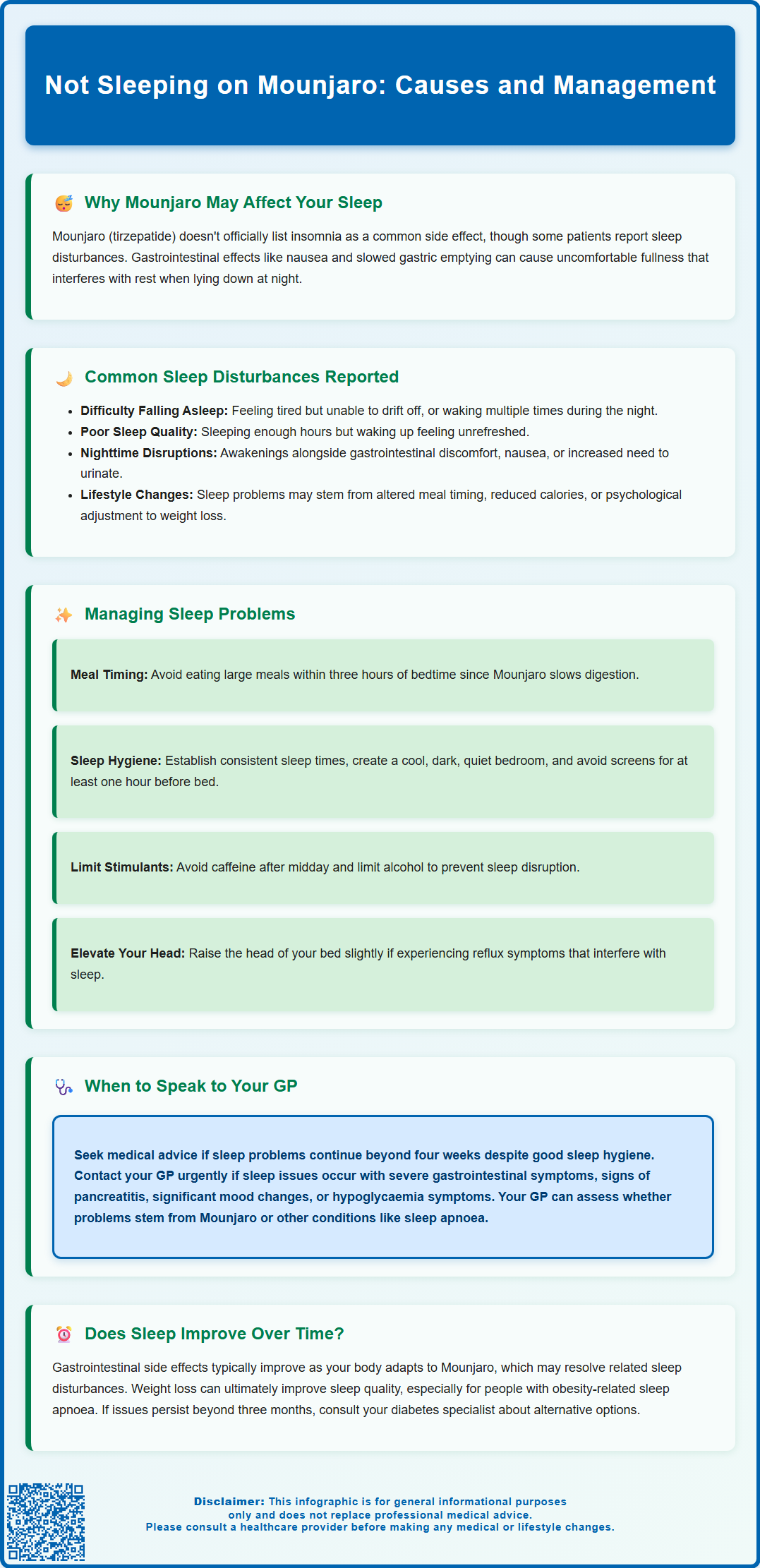Not sleeping on Mounjaro is a concern reported by some patients taking this type 2 diabetes medication. Mounjaro (tirzepatide) is a dual GIP and GLP-1 receptor agonist licensed in the UK for diabetes management. Whilst insomnia is not listed as a common adverse effect in the MHRA product information, anecdotal reports suggest some individuals experience sleep disturbances. These may relate to gastrointestinal side effects such as nausea and delayed gastric emptying, or to broader lifestyle changes accompanying treatment. Understanding potential causes and management strategies can help you address sleep difficulties whilst continuing effective diabetes control.
Summary: Sleep disturbances on Mounjaro are not officially listed as common adverse effects, but may occur due to gastrointestinal side effects, lifestyle changes, or other factors rather than direct medication action.
- Mounjaro (tirzepatide) is a dual GIP/GLP-1 receptor agonist licensed in the UK for type 2 diabetes treatment.
- Gastrointestinal side effects such as nausea and delayed gastric emptying may indirectly disrupt sleep in some patients.
- Sleep disturbances may improve as the body adjusts to medication, particularly following the gradual dose escalation schedule.
- Practical strategies include optimising sleep hygiene, adjusting meal timing, and managing gastrointestinal symptoms proactively.
- Seek medical advice if sleep problems persist beyond four weeks or are accompanied by severe symptoms such as persistent vomiting or abdominal pain.
- Weight loss achieved with Mounjaro may ultimately improve sleep quality, particularly in patients with obesity-related sleep apnoea.
Table of Contents
Why Mounjaro May Affect Your Sleep
Mounjaro (tirzepatide) is a dual glucose-dependent insulinotropic polypeptide (GIP) and glucagon-like peptide-1 (GLP-1) receptor agonist licensed in the UK for the treatment of type 2 diabetes mellitus. The Medicines and Healthcare products Regulatory Agency (MHRA) product information does not list insomnia as a common adverse effect, though anecdotal reports and patient forums suggest that some individuals experience sleep disturbances whilst taking this medication.
The mechanism by which Mounjaro might influence sleep is not fully established, but several plausible explanations exist. Gastrointestinal side effects—particularly nausea, vomiting, and abdominal discomfort—are amongst the most frequently reported adverse reactions with tirzepatide according to the MHRA Summary of Product Characteristics (SmPC). These symptoms may be uncomfortable during the night or when lying flat, potentially disrupting sleep. Additionally, the medication's effect on gastric emptying may lead to feelings of fullness that some patients find uncomfortable when trying to rest.
It is important to note that there is no official direct link between Mounjaro and insomnia established in clinical trials, and sleep disturbances may be multifactorial. Other factors that could affect sleep include changes in blood glucose levels, lifestyle modifications, dietary changes, or pre-existing conditions such as obstructive sleep apnoea, which is common in people with type 2 diabetes. Caffeine intake, alcohol consumption, and stress may also contribute to sleep difficulties independently of medication effects.
Common Sleep Disturbances Reported with Mounjaro
Some patients taking Mounjaro have reported various sleep-related concerns, though the prevalence and severity vary considerably between individuals. Difficulty falling asleep is among the sleep problems described by some people, who report lying awake despite feeling tired.
Nocturnal awakenings represent another pattern that some patients describe, where they may wake multiple times throughout the night. These awakenings might coincide with gastrointestinal discomfort or nausea. Some patients also report needing to use the toilet during the night, particularly if they have increased their fluid intake as part of lifestyle changes or if they are taking other medications such as SGLT2 inhibitors that can increase urination.
Some individuals report changes in sleep quality rather than quantity—sleeping for an adequate number of hours but waking feeling unrefreshed. For patients taking Mounjaro alongside insulin or sulfonylureas, it's worth noting that nocturnal hypoglycaemia can cause night sweats, nightmares or morning headaches, which might be mistaken for direct medication effects.
It is worth noting that sleep disturbances may also relate to the lifestyle and dietary changes that often accompany Mounjaro treatment. Reduced caloric intake, altered meal timing, increased physical activity, and the psychological adjustment to weight loss can all independently affect sleep patterns. Distinguishing between medication-related effects and those stemming from broader lifestyle modifications can be challenging but is important for appropriate management.

Managing Sleep Problems While Taking Mounjaro
If you are experiencing sleep difficulties whilst taking Mounjaro, several practical strategies may help improve your rest without necessarily requiring medication changes. Discussing injection timing with your healthcare professional may be helpful, though it's important to note that tirzepatide has a long half-life, so time of day usually makes limited difference to side effects. According to the SmPC, Mounjaro can be administered once weekly at any time of day, with or without meals. If changing your injection day, ensure there are at least 3 days between doses.
Dietary modifications can significantly impact sleep quality. Avoid large meals within three hours of bedtime, as Mounjaro slows gastric emptying and late eating may exacerbate feelings of fullness. Smaller, more frequent meals throughout the day may help manage gastrointestinal symptoms. Limiting caffeine intake, particularly after midday, and reducing alcohol consumption can also support better sleep, as both substances can disrupt sleep architecture.
Establishing a consistent sleep hygiene routine is fundamental. Maintain regular sleep and wake times, even at weekends, to reinforce your body's natural circadian rhythm. Create a cool, dark, and quiet sleeping environment, and consider elevating the head of your bed slightly if reflux symptoms are problematic. Engage in relaxing activities before bed—such as reading, gentle stretching, or listening to calming music—whilst avoiding screens for at least an hour before sleep.
Managing gastrointestinal side effects proactively may indirectly improve sleep. If nausea is troublesome, discuss with your GP whether anti-emetic medications might be appropriate. For reflux symptoms, your GP might consider a short course of acid-suppressing medication if lifestyle measures are insufficient. If side effects are particularly troublesome, your healthcare team might consider a slower dose titration schedule or temporarily reducing your dose. Always report suspected side effects to your healthcare professional or via the MHRA Yellow Card scheme.
When to Speak to Your GP About Sleep Issues
Whilst mild, transient sleep disturbances may resolve as your body adjusts to Mounjaro, certain situations warrant prompt discussion with your GP or diabetes care team. Seek medical advice if sleep problems persist beyond four weeks despite implementing good sleep hygiene practices, as chronic insomnia can significantly impact quality of life, metabolic control, and cardiovascular health.
You should contact your GP urgently if sleep disturbances are accompanied by:
-
Severe or persistent gastrointestinal symptoms such as unrelenting nausea, repeated vomiting, severe abdominal pain, or signs of dehydration (extreme thirst, dry mouth, reduced urination, dizziness)
-
Symptoms suggestive of pancreatitis, including severe upper abdominal pain radiating to the back, particularly if associated with nausea and vomiting
-
Right upper abdominal pain, fever or yellowing of the skin or eyes, which could indicate gallbladder problems
-
Significant mood changes or thoughts of self-harm (while a causal link between GLP-1/GIP agonists and mood changes is not established, seek urgent help for such symptoms regardless of cause)
-
Symptoms of hypoglycaemia (if taking Mounjaro alongside insulin or sulfonylureas), such as night sweats, nightmares, or morning headaches
-
Unexplained rapid heart rate or palpitations that disturb sleep
Your GP can conduct a thorough assessment to determine whether sleep problems are directly related to Mounjaro, secondary to its side effects, or due to other factors such as sleep apnoea, restless legs syndrome, or mental health concerns. They may consider:
-
Reviewing your medication regimen and adjusting the Mounjaro dose if appropriate
-
Investigating underlying sleep disorders through referral to a sleep clinic if indicated
-
Optimising management of comorbidities such as gastro-oesophageal reflux disease or anxiety
-
Providing short-term symptomatic relief through appropriate medications whilst longer-term strategies are implemented
Never discontinue Mounjaro without medical supervision, as abrupt cessation may affect your diabetes control. Remember to report any suspected adverse reactions to the MHRA through the Yellow Card scheme.
Does Sleep Improve as Your Body Adjusts to Mounjaro?
For many patients, gastrointestinal side effects associated with Mounjaro tend to improve over time as the body adapts to the medication, according to the SmPC. If sleep disturbances are related to these gastrointestinal symptoms, sleep quality may improve correspondingly as side effects lessen.
Clinical experience suggests that the dose escalation schedule plays an important role in tolerability. Mounjaro is initiated at a low dose (2.5 mg once weekly) and gradually increased at four-week intervals, allowing the body time to adjust to each increment. Some patients report that symptoms, including sleep disturbances, may fluctuate following dose increases. If you find that symptoms are particularly troublesome, discuss with your healthcare team whether a slower titration schedule might be appropriate for you.
Weight loss itself may ultimately improve sleep for many individuals, particularly those with obesity-related sleep apnoea. NHS guidance confirms that as body weight decreases, airway obstruction during sleep may lessen, leading to better oxygenation, fewer apnoeic episodes, and more restorative sleep. Some patients report that whilst they experienced initial sleep difficulties, their overall sleep quality eventually improved beyond their pre-treatment baseline as they lost weight and their metabolic health improved.
However, it is important to recognise that individual responses vary considerably. A minority of patients may experience persistent sleep problems that do not resolve with time. In such cases, the benefits of continuing Mounjaro for diabetes control must be weighed against the impact of chronic sleep deprivation on overall health and quality of life. Regular follow-up with your healthcare team allows for ongoing assessment and adjustment of your treatment plan. If sleep problems persist beyond three months despite appropriate management strategies, alternative treatment options may need to be considered in consultation with your diabetes specialist.
Frequently Asked Questions
Does Mounjaro cause insomnia?
Insomnia is not listed as a common adverse effect in the MHRA product information for Mounjaro. However, some patients report sleep disturbances that may relate to gastrointestinal side effects such as nausea or to lifestyle changes accompanying treatment.
Will sleep problems improve as I adjust to Mounjaro?
For many patients, gastrointestinal side effects and related sleep disturbances improve over time as the body adapts to Mounjaro, particularly with the gradual dose escalation schedule. Weight loss may also ultimately improve sleep quality, especially in those with obesity-related sleep apnoea.
When should I contact my GP about sleep problems on Mounjaro?
Seek medical advice if sleep problems persist beyond four weeks despite good sleep hygiene, or urgently if accompanied by severe symptoms such as persistent vomiting, severe abdominal pain, signs of pancreatitis, or significant mood changes.
The health-related content published on this site is based on credible scientific sources and is periodically reviewed to ensure accuracy and relevance. Although we aim to reflect the most current medical knowledge, the material is meant for general education and awareness only.
The information on this site is not a substitute for professional medical advice. For any health concerns, please speak with a qualified medical professional. By using this information, you acknowledge responsibility for any decisions made and understand we are not liable for any consequences that may result.
Heading 1
Heading 2
Heading 3
Heading 4
Heading 5
Heading 6
Lorem ipsum dolor sit amet, consectetur adipiscing elit, sed do eiusmod tempor incididunt ut labore et dolore magna aliqua. Ut enim ad minim veniam, quis nostrud exercitation ullamco laboris nisi ut aliquip ex ea commodo consequat. Duis aute irure dolor in reprehenderit in voluptate velit esse cillum dolore eu fugiat nulla pariatur.
Block quote
Ordered list
- Item 1
- Item 2
- Item 3
Unordered list
- Item A
- Item B
- Item C
Bold text
Emphasis
Superscript
Subscript










